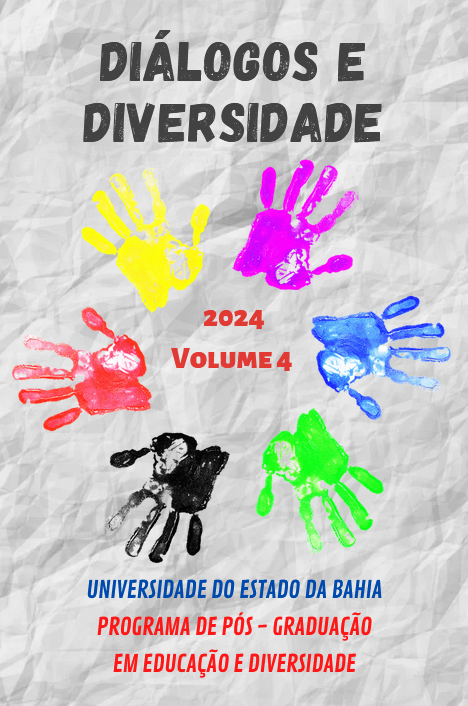PRECONCEITO LINGUÍSTICO E VARIAÇÕES LINGUÍSTICAS NO CONTEXTO ESCOLAR: ESTUDO DE CASO EM UMA ESCOLA DE ENSINO FUNDAMENTAL NO MUNICÍPIO DE PARINTINS /AM
Keywords:
linguistic prejudice, linguistic variations, teacher, student, school, standard norm.Abstract
The present work aims to analyze the issue of linguistic prejudice, linguistic variation and what is the perception and concern that the Portuguese language teacher and elementary school students of a public school in the city of Parintins/AM have in relation to the subject in question. . This concern arose when noticing that in the teaching of Portuguese in the early years of elementary school, the focus is on traditionalist teaching, a factor that centralizes normative grammar, that is, that treats grammar as the only correct form, thus disregarding the other linguistic varieties, which will later result in linguistic prejudice in relation to the other varieties, since before the standard norm they are classified as wrong. From this fact arose the question that guided this research: The teachers who teach the Portuguese language subject in the early years of elementary school, are bringing up from the early grades the fact that linguistic prejudice exists and making the proper placement between standard norm and linguistic varieties? To arrive at a concrete answer, field research methods were used, of a qualitative nature, via observation, conversation wheel and interview. The result of the research was as expected, since little is said about the subject in schools, thus proving that there is no concern on the part of teachers to deconstruct linguistic prejudice and thus explain its various facets and give visibility to the innumerable linguistic variations from all four corners of the country.
Downloads
References
ANDRADE, Carlos Drummond de (org). Poesia completa. Rio de Janeiro: Nova Aguilar, 2002.
BAGNO, Marcos. Preconceito Linguístico: O que é. E como se faz?49. ed. São Paulo: Editora Loyola, 1999.
BAGNO, Marcos. Nada na língua é por acaso: por uma pedagogia de variação linguística. Parábola: São Paulo, 2002.
BAGNO, Marcos. A norma oculta: língua & poder na sociedade brasileira. São Paulo: Parábola Editorial, 2003.
BAGNO, M. Preconceito linguístico - o que é, como se faz. 40ª edição. São Paulo: Edições Loyola, 2006.
BAGNO, Marcos. Nada na língua é por acaso: por uma pedagogia da variação linguística. São Paulo: Parábola, 2007.
BAGNO, Marcos. Preconceito linguístico: o que é, como faz. 55.ed. São Paulo: Edições Loyola, 2013.
BAGNO, Marcos; RANGEL, Egon de Oliveira. Tarefas da educação linguística no Brasil. Rev. Brasileira de Linguística Aplicada, v. 5, n. 1, 2005.
BORTONI-RICARDO, Stella Maris. Educação em língua Materna: a sociolinguística na sala de aula. São Paulo: Parábola, 2004
BRASIL. Base Nacional Comum Curricular. Brasília: MEC, 2017
BRITO, José A. M. As práticas de letramento no contexto da EJA. (Dissertação de Mestrado). Manaus: UFAM/PPGE,2010.
CARNEIRO, Vera Lúcia G. Diversidade linguística: variação linguística e prática pedagógica. ENTRELETRAS, Araguaína/TO, v. 5, n. 2, p. 102-111, ago./dez. 2014.
CARVALHO (ORG.), Maria Cecília M. de. Construindo o saber: Metodologia científica Fundamentos e técnicas. 9.ed. São Paulo: Papirus, 2000.
FREIRE, Paulo, Pedagogia do Oprimido.17ª ed. Rio de Janeiro: Paz e Terra, 1987
GIL, A.C, Como elaborar projetos de pesquisa. São Paulo: Atlas. 2022.
GOLDENGERG, Mirian. A arte de pesquisar: como fazer pesquisa qualitativa em ciência sociais. 4 ed. Rio de janeiro: Record, 2000.
LAKATOS, Eva Maria; MARCONI, Marina de Andrade. Metodologia do trabalho científico: procedimentos básicos, pesquisa bibliográfica, projeto e relatório, publicação e trabalhos científicos. 4.ed. São Paulo: Atlas, 1992.
MARIANI, Berthania. Colonização Linguística. Campinas, SP: Pontes, 2004.
MARCONI, Marina de Andrade; LAKATOS, Eva Maria. Fundamentos de metodologia científica. 7. ed. São Paulo: Atlas, 2010.
PONCIANO, Silmara Aparecida. Valorização e resgate das variedades linguísticas em alunos oriundos da zona rural do município de Tomazina. 2014. Monografia de Especialização em Educação: Métodos e Técnicas de Ensino, Universidade Tecnológica Federal do Paraná, Medianeira, 2014. 42f.
TRAVAGLIA, Luiz Carlos. Gramática e interação: uma proposta para o ensino de gramática no 1º e 2º graus. São Paulo: Cortez, 1996.
Downloads
Published
How to Cite
Issue
Section
License
Copyright (c) 2024 Hellen Cristina Picanço Simas, Amanda da Silva Pontes

This work is licensed under a Creative Commons Attribution-ShareAlike 4.0 International License.
Direitos Autorais
A submissão de originais para a Revista Diálogos e Diversidade (RDD) implica na transferência, pelas(os) autoras(es), dos direitos de publicação. Os direitos autorais para os manuscritos publicados nesta revista são das(os) autoras(es), com direitos da RDD sobre a primeira publicação. As(os) autoras(es) somente poderão utilizar os mesmos resultados em outras publicações indicando explicitamente a RDD como o meio da publicação original.
Licença Creative Commons
Exceto onde especificado diferentemente, aplicam-se à matéria publicada neste periódico os termos de uma licença Creative Commons Attribution-ShareAlike 4.0 International License, que permite copiar e redistribuir o material em qualquer suporte ou formato, adaptar, remixar, transformar, e criar a partir do material para qualquer fim, mesmo que comercial, dando o crédito apropriado, prover um link para a licença e indicar se mudanças foram feitas, distribuindo as suas contribuições sob a mesma licença que o original, não podendo aplicar termos jurídicos ou medidas de caráter tecnológico que restrinjam legalmente outros de fazerem algo que a licença permita.



 Esta obra está licenciada com uma Licença
Esta obra está licenciada com uma Licença 